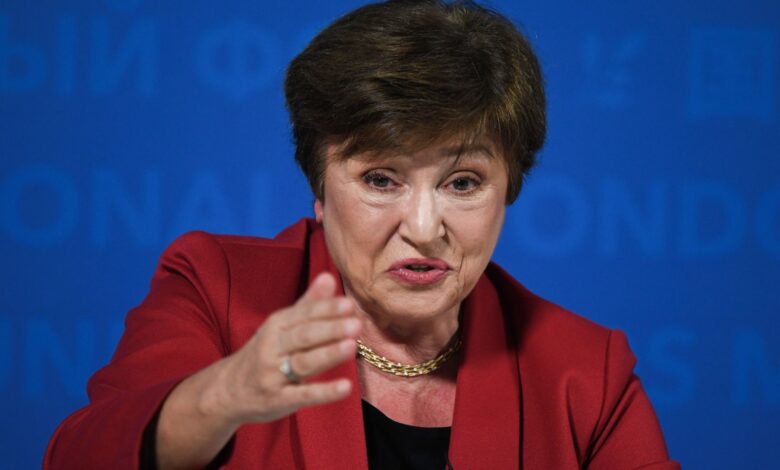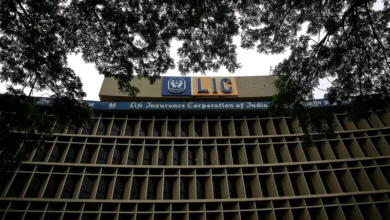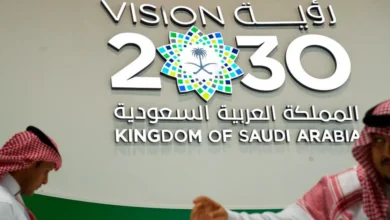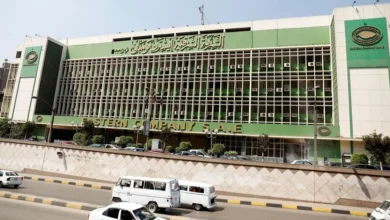IMF chief sees Egypt exchange rate situation as a ‘disaster’

The exchange rate situation in Egypt, characterized by its multiplicity, is seen as disastrous by Kristalina Georgieva, the Managing Director of the International Monetary Fund (IMF), who advocates for the market to determine these rates.
In an interview with Al Arabiya Business on the sidelines of the World Governments Summit held in Dubai, Georgieva emphasized the need for Egypt to move toward allowing the market to set the exchange rate.
“The flexibility of the exchange rate is a buffer against shocks… Multiple exchange rates is a disaster, it doesn’t work. So Egypt has to move in the direction of which it is the market that defines the exchange rate,” she said.
Georgieva revealed that the fundamental aspects of the agreement with Egypt regarding the proposed loan were agreed upon, mentioning that their delegation’s visit to Cairo was “relatively close” to success. She highlighted that Egypt’s financing needs have grown, and the IMF is working with other parties to fulfill these needs.
She noted, “We are working on the final details of the agreement. I don’t want to predict exactly when, but it will be relatively soon since all the major issues for review have been agreed upon following a very successful two weeks of our team’s visit to Cairo. More work is needed to consider the changing conditions.”
Georgieva pointed out that in the short time between the IMF team’s departure from Washington and return, the impact of Red Sea attacks on traffic through the Suez Canal was observed. She mentioned, “Now the income from the canal is nearly half of what it was before the attacks, which have a material impact on Egypt, as the Suez Canal could provide an income of $700 million per month. Now, this income is smaller.”
The discussion also covered adjusting the program in light of current developments and increasing the loan due to the clear need for intensified efforts with Egypt.
During a press conference attended at the Arab Financial Forum, Georgieva said that external shocks forced Egypt to take strong measures to rebuild its economy, as the IMF is in intense discussions for the first and second review with Egypt. The IMF had announced an agreement with Egypt on the key elements of the economic reform program earlier this year.
Georgieva added that the IMF focuses on Egypt’s ability to reduce inflation, which takes priority in their program. She emphasized that a flexible exchange rate brings stability to the country, protecting Egypt from inflation and setting up social protection for vulnerable people and the middle class.
The Egyptian Central Bank has requested banks to tally requests for foreign currency procurement, underlining the importance of fully restoring economic capacity with flexibility and focusing on the private sector as a source of growth and job creation.
The government fixed the currency at 30.85 Egyptian pounds to the dollar in March, but the currency has depreciated to about 60 pounds against the dollar in the black market. It has also reached at some point to almost 75 pounds to the dollar this month.
The shock of a 40 percent decrease in Suez Canal revenues in the first half of January immediately reflected on the Egyptian economy, as a Reuters survey showed. The survey, involving 14 economic experts, reduced the growth forecast of the Egyptian economy for the current fiscal year to 3.5 percent, down from 3.9 percent in the previous survey in October and 4.2 percent in July.
The survey also predicted the official exchange rate of the Egyptian pound would decline to 40 against the dollar by the end of June next year and to 43 pounds per dollar by the end of June 2025. These new predictions come amid the depreciation of the pound, reduced purchasing power due to rising inflation, the impacts of the war in Gaza, reduced Suez Canal revenues following Houthi attacks on commercial ships in the Red Sea, and decreased tourism expectations.
This disappointing survey followed a downgrade by Moody’s in January, changing its future outlook for Egypt from “stable” to “negative.” The Egyptian economy continues to face challenges amidst the stalemate in the agreement with the IMF signed in December 2022, as Egypt refrained from transitioning to a flexible exchange rate system. The IMF is in talks with Cairo to discuss completing and possibly expanding Egypt’s financial package.










